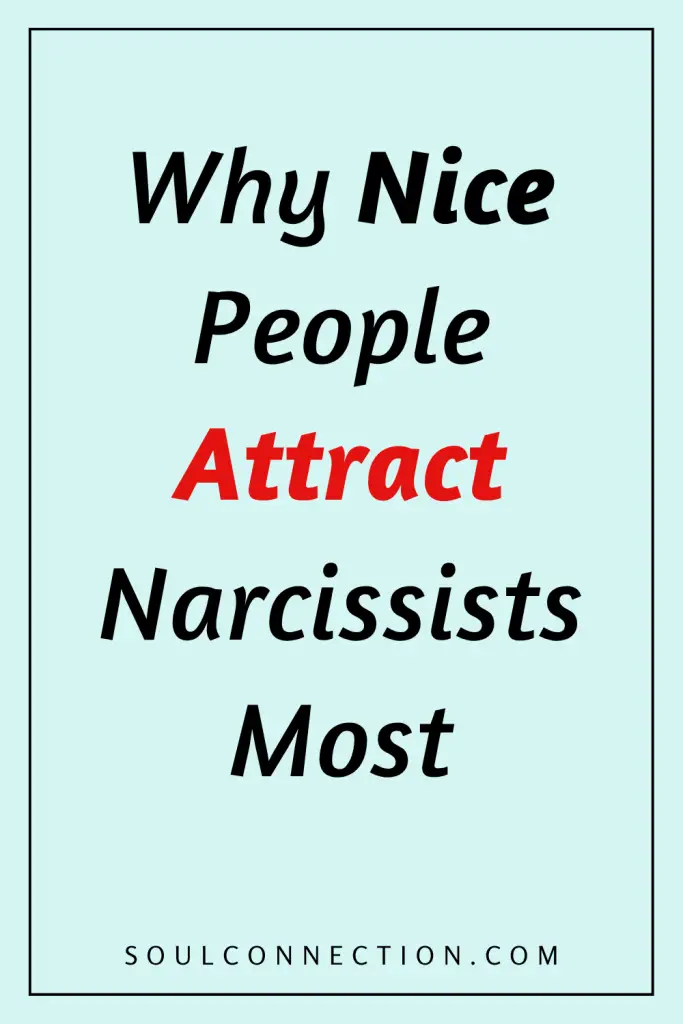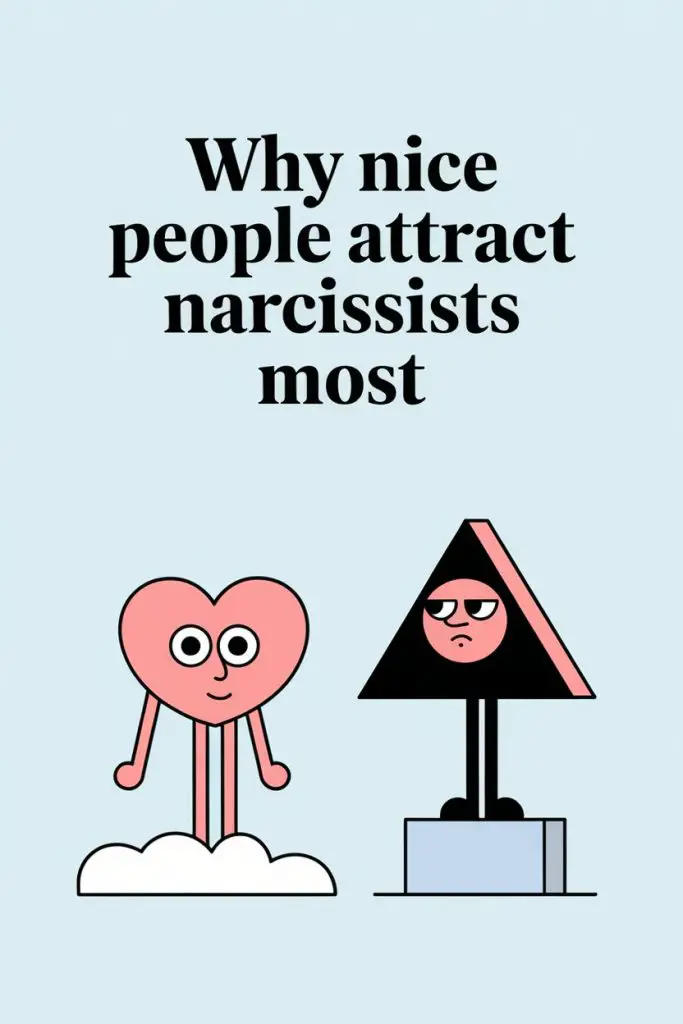Nice people have a sixth sense for trouble, but when it comes to narcissists, even the kindest hearts can end up blindsided.
Ever wondered why the sweetest souls seem to have narcissists circling them like moths to a porch light? The answer isn’t as simple as “being too nice.” There’s a lot more happening under that warm, generous surface.
When Kindness Meets Narcissism
Narcissists are drawn to kindness the way seagulls flock to a chip dropped on the beach. That’s because genuine niceness is magnetic to everyone—including those who want to take more than they give.
People with big hearts often believe in seeing the good in others. They want to trust, to nurture, and to help. There’s a certain optimism that everyone’s redeemable, and narcissists know how to play to that hope like a fiddle.
Narcissists, with their radar for generosity, spot these qualities instantly. A kind person’s willingness to forgive, compromise, and empathize can be mistaken for a green light to push boundaries.
People-Pleasing: A Narcissist’s Favorite Flavor
Nice folks frequently aim to please. They worry about hurting feelings, love making others comfortable, and would rather swallow a complaint than risk sounding rude. Sound familiar?
Narcissists adore this trait. A people-pleaser won’t speak up when the narcissist interrupts, belittles, or demands the world on a platter. Instead, they’ll offer excuses for the behavior, hoping kindness will win the day.
Spoiler: It rarely does with narcissists.
If you’ve found yourself apologizing for things that aren’t your fault, or bending over backwards to avoid conflict, you might have just set out a welcome mat for narcissistic types.
Boundaries: The Invisible Fence That’s Missing
Healthy boundaries are like those invisible electric fences that keep the neighbor’s dog out of your yard. Many nice people grew up learning that boundaries are rude, selfish, or even mean.
They’d rather have sore feet from standing too long than hurt someone by saying “no.”
Narcissists see weak boundaries as an open invitation. If you can’t say ‘enough’ or push back when they cross a line, they know they’ve found fertile ground.
The narcissist’s sense of entitlement pairs perfectly with a partner who’s hesitant to enforce limits.
No, you don’t have to build a moat with crocodiles. But a “no” given with a smile works wonders.
The Fixer Instinct
Many nice people are compulsive fixers. They spot pain, toxicity, or brokenness and immediately go to work with emotional duct tape. Narcissists, who are experts at playing the victim when it suits them, lap this up.
The “if I love them enough, they’ll change” trap is practically a rite of passage for empathetic souls. Narcissists thrive on this hope.
They allow just enough vulnerability through the cracks to hook the fixer, then keep the drama rolling so the fixer never quite feels finished.
An endless loop of “maybe this time” is catnip for narcissists—and exhausting for their partners.
Empathy as a Double-Edged Sword
Empathy is the superpower of the genuinely nice. The ability to see and feel another’s pain can make you the best friend, partner, or confidant anyone could ask for. Sadly, narcissists treat this gift like a bottomless resource.
They’ll unload their woes, manipulate sympathy, and even weaponize your compassion. Empaths often find themselves twisted in knots, wondering what they did wrong, when in reality, they’ve just been pulled into the narcissist’s orbit.
Being able to walk a mile in someone’s shoes doesn’t mean you have to carry them on your back.
Self-Doubt and the Search for Validation
Nice people often second-guess themselves, especially when they care deeply about others’ opinions.
Enter the narcissist, a master of charm (when it suits them) and criticism (when it doesn’t). They alternate between praise and put-downs, keeping their partner off balance.
If you’re always looking for validation from someone who withholds it, you’ll work even harder to “earn” their approval. Narcissists love this dynamic—it gives them all the control and keeps you chasing the next breadcrumb of affection.
If you’re stuck in a loop of “What did I do wrong?” it’s not you—it’s the game you’re being pulled into.
The Allure of Idealism
Nice people tend to idealize love and relationships. The fairy-tale narrative runs deep: if you just love hard enough, forgive enough, or are patient enough, you’ll get the happily ever after.
Narcissists thrive in this environment.
They present a dazzling mask at first, sweeping you off your feet with grand gestures, charm, and promises. Then, when reality sets in, the idealist keeps hoping the “real” partner (the one from the beginning) will return.
That original charm was just the bait. The real relationship is whatever keeps the narcissist satisfied.
Fear of Conflict
Disliking conflict is practically a job requirement for nice people. Narcissists aren’t afraid to use anger, cold shoulders, or criticism to get their way.
The gentle soul, desperate to keep the peace, will often cave or apologize just to stop the discomfort.
This dynamic gives the narcissist all the power in disagreements. If your goal is “just keep the waters calm,” you may find yourself agreeing to things that make you unhappy or uncomfortable.
A small disagreement is not the same as the collapse of civilization. It’s okay to ruffle feathers sometimes.
How to Hit the Brakes
Spotting the pattern is half the battle. If you’re a nice person who keeps attracting narcissists, it’s time to make a few tweaks—without turning into a cynic or a hard-nosed skeptic.
- Practice saying no (even to small things). Start with the easy stuff, like turning down a second helping of potatoes if you’re full. Confidence grows with practice.
- Check your fixer reflex. Instead of immediately jumping in to help, ask, “Does this person want my help, or do they want me to listen?” Sometimes, people just need a sounding board, not a project manager.
- Don’t apologize for your boundaries. Having needs doesn’t make you selfish. It makes you human.
- Notice the validation dance. If you feel like you’re walking on eggshells waiting for approval, take a step back and ask why.
- Give your empathy some guardrails. You can understand someone’s pain without signing up to suffer alongside them indefinitely.
- Embrace healthy conflict. A little discomfort now prevents a lot more pain later on.
Turning Kindness into Strength
Being nice isn’t the problem. The issue comes from using kindness as a shield instead of as a tool.
When you set boundaries, own your needs, and allow yourself to walk away from takers, kindness becomes your superpower—not your Achilles’ heel.
Narcissists will move on when they realize you’re not an easy target. And that leaves space for people who appreciate your warmth, humor, and heart—without draining you dry.
Here’s to nice people—may your next porch light attract butterflies, not moths.


